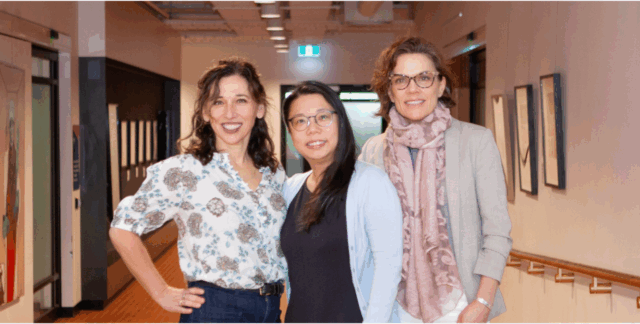In 2018, CSIRO realised that at their current rate of change, it was going to take decades for their research workforce to reach gender parity. But after 6 years of concerted interventions in their recruitment policies and approaches, they have started to see an accelerating rate of change.
They’ve now increased the proportion of women in their research workforce by 4 percentage points, from 34 to 38%.
These efforts to increase gender diversity through their recruitment processes has now earned CSIRO their second SAGE Cygnet Award.
A collaborative effort
SAGE CEO Dr Janin Bredehoeft congratulated CSIRO on the breadth of their interventions.
“This is an approach to recruitment that has been really broad-ranging and considered” said Janin.
“CSIRO has recognised the importance of messaging, images and language in how their organisation is understood by potential applicants, as well as strategies to reduce remove bias from the hiring processes.”
“Congratulations to everyone from CSIRO who collaborated to make this project possible. It’s important work and deserves celebration.”
Removing gendered language and building inclusive messages
CSIRO was concerned that their messaging in job advertisements – and promotions campaigns more broadly – were inadvertently discouraging women from applying for research roles.
To tackle this, they conducted a gender-based analysis of branding and communications materials to develop a clear and consistent message that explained CSIRO’s work, with a focus on the employee value proposition.
CSIRO also introduced new advertising protocols, avoiding jargon and reducing the amount of criteria that an applicant must meet in order to apply.
They broadened advertising locations, introducing ads on websites that focus on careers for women and people from diverse backgrounds.
More women applying and interviewed
Between 2019 and 2022, the number of applications received from women increased 86% Applications from men also increased, but the proportion of applications coming from women increased to 33.1%.
When surveyed, 88% of respondents who were applying for jobs at CSIRO mentioned key messages from the Employee Value Proposition when explaining what appealed to them about CSIRO’s work, showing that the changed messaging was clear and resonated with applicants. As one respondent put it, “I wanted to work somewhere with a good culture (inclusive, diverse, leadership-focused etc.) where I could do work that was innovative and impact-driven.”
At the end of the period, women were also more likely to receive an interview for a research role, with the proportion of women interviewees increasing from 13% to 15%.
They also saw an increase of 40% in applications from people who identify as gender diverse, and an 18% increase in interviews.
More work to do: beyond gender
While new hires from non-English speaking backgrounds reduced somewhat over the intervention period (from a high point in 2019), this measure has once again been gaining ground since 2020. Women researchers with disability were also hired at an increasing rate during this period, year on year.
However, CSIRO noticed that there was a actually reduction in the proportion of Aboriginal and Torres Strait Islander women appointed during the period they were implementing their recruitment interventions. They have since brought in a targeted approach to supporting First Nations recruitment, as part of their 2023 Aboriginal and Torres Strait Islander Employment Strategy.
About the award
This is CSIRO’s second SAGE Cygnet Award, following a previous award for building inclusive workplace practices. Cygnets are awarded to organisations that can demonstrate they have achieved sufficient progress and impact in removing or reducing a key barrier to equality.
CSIRO’s two Cygnet Awards build on their 2018 Athena Swan Bronze Award accreditation. Organisations can earn five Cygnet Awards before they become eligible for the next stage of accreditation: the Athena Swan Silver Award.
The Athena Swan framework has been designed to support improvements in equity, diversity and inclusion in the education and research sector. SAGE is the only organisation that administers the framework in Australia.
Learn from CSIRO’s actions
You can learn from these actions and replicate them in your own organisation. CSIRO’s full application is available here.



